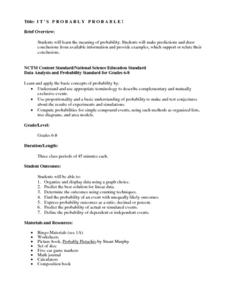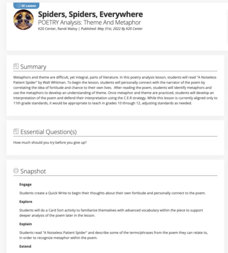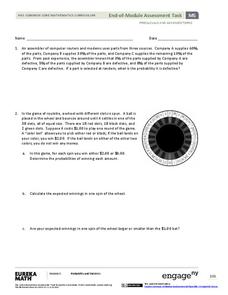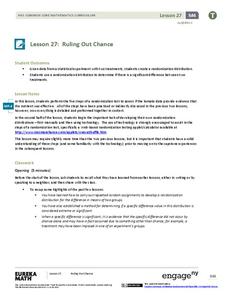National Security Agency
It's Probably Probable
Learners make predictions and draw conclusions from given information as they learn the meaning of probability in this vocabulary-rich, integrated activity that presents a variety of teaching strategies to motivate and reach all learning...
K20 LEARN
Spiders, Spiders, Everywhere: Poetry Analysis - Theme And Metaphor
Walt Whitman's poem "A Noiseless Patient Spider" provides high schoolers an opportunity to reflect on the importance of perseverance and fortitude. After drafting a Quick Write about a time they tried and tried again to accomplish...
Project Maths
Introduction to Probability
Take a chance with an activity sure to improve your class's skills. An introductory lesson focuses on probability and chance. It shows how probability is always a value between zero and one, i.e., the probability of an event is always...
National Council of Teachers of Mathematics
The Game of SKUNK
Do I stand or do I sit? The class plays a dice game where they must decide to either continue to stand and play or sit down and keep their points. After the game, groups discuss individuals' strategies and see connections to the...
CK-12 Foundation
Applications of Probability: What Are the Odds?
Improve your chances of understanding odds. Scholars use an interactive spinner to increase and decrease the number of favorable and unfavorable sections on the spinner. This spinner helps them learn about odds.
EngageNY
Using Tree Diagrams to Represent a Sample Space and to Calculate Probabilities
Cultivate the tree of knowledge using diagrams with two stages. Pupils create small tree diagrams to determine the sample space in compound probability problems. The lesson uses only two decision points to introduce tree diagrams.
EngageNY
Chance Experiments with Equally Likely Outcomes
Take a deeper dive into equally likely probabilities. Pupils build upon their understanding of probability by determining sample spaces and outcomes. Individuals work with sample spaces and determine outcomes that are equally likely....
EngageNY
The Difference Between Theoretical Probabilities and Estimated Probabilities
Flip a coin to determine whether the probability of heads is one-half. Pupils use simulated data to find the experimental probability of flipping a coin. Participants compare the long run relative frequency with the known theoretical...
EngageNY
Chance Experiments
Class members are introduced to probability using terms such as impossible, unlikely, likely, and certain. Numbers between zero and one are associated with the descriptions of probability. Pupils find the likelihood of chance experiments...
EngageNY
Mid-Module Assessment Task: Grade 7 Mathematics Module 5
Determine the probability that the class knows probability. The three-question assessment presents problems with finding the sample space and the probability, theoretical and experimental, of a variety of situations. Pupils also describe...
EngageNY
Calculating Probabilities for Chance Experiments with Equally Likely Outcomes
Calculate theoretical probabilities and compare them to experimental probabilities. Pupils build on their knowledge of experimental probabilities to determine theoretical probabilities. Participants work several problems with the...
Balanced Assessment
The Contest
Good advertisers can make mathematics seem irrelevant. Teach your classes to use math to see through these tactics and make good decisions. The posed task has pupils analyze sweepstakes statistics to determine and compare the cost of...
EngageNY
End-of-Module Assessment Task - Precalculus (Module 5)
Give your young scholars a chance to show what they've learned from the module. The last installment of a 21-part series is an end-of-module assessment task. It covers basic and conditional probabilities, expected value, and analyzing...
EngageNY
Fair Games
What constitutes a fair game? Scholars learn about fair games and analyze some to see if they are fair. They extend this idea to warranties and other contexts.
EngageNY
Games of Chance and Expected Value 2
Use expected values to analyze games of chance. The 15th installment of a 21-part module has young mathematicians looking at different games involving tickets and deciding which would be the best to play. They calculate expected payoffs...
EngageNY
Games of Chance and Expected Value 1
There's a strong chance that class members enjoy learning math through engaging games. Scholars analyze games of chance to determine long-term behavior. They learn to calculate expected value to help with this assessment.
Bowland
How Risky is Life?
"Life is more risk management, rather than exclusion of risks." -Walter Wriston. Scholars use provided mortality data to determine how likely it is a person will die from a particular cause. They compare the data to the perception of the...
EngageNY
Ruling Out Chance (part 2)
Help your classes find the significance in this lesson! Learners analyze the probability of Diff values. They then determine if the difference is significant based on their probability of occurrence.
EngageNY
Ruling Out Chance (part 3)
Pupils analyze group data to identify significant differences. They use simulation to create their own random assignment data for comparison.
EngageNY
Ruling Out Chance (part 1)
What are the chances? Teach your classes to answer this question using mathematics. The first part of a three-day lesson on determining significance differences in experimental data prompts learners to analyze the data by determining the...
Mathematics Assessment Project
Spinner Bingo
Learners are in it to win it for a fun math activity! After comparing Bingo boards to figure out which one is most likely to win, individuals then determine the numbers to choose in order to create a board with the best chance of winning.
Math Worksheets 4 Kids
Probability Worksheet
Your learners probably will enjoy practicing a variety of concepts as they work through these eight probability worksheets. The first few worksheets emphasize basic probability using cards, the months in a year, and the number of...
National Security Agency
Are You Game? A Lesson Connecting Fractions and Probability
Exactly how fair are the board games children grow up playing? Young mathematicians investigate this questions as they work their way through this five-lesson series on basic probability.
Kentucky Adult Education
Probability Lesson Plan
Roll the dice with this multimedia math lesson on probability. After first viewing a series of three short videos explaining probability, independent events, and dependent events, young mathematicians complete a set of practice...

























